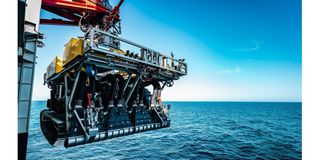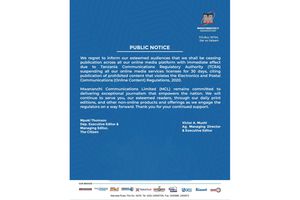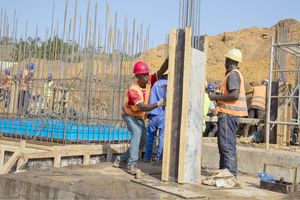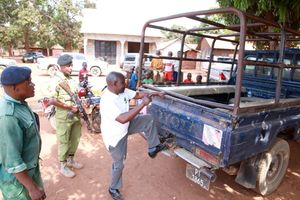Why Africa wants a new ISA leadership, united against immediate seabed mining

Currently, the International Seabed Authority, ISA (the regulator of deep-sea mining in international waters), which is based in Kingston, Jamaica, is a hive of activities.
Since last week, world leaders have been discussing the future of the deep ocean, under auspices of ISA.
But this is a more crucial moment than meetings held in the last 2 or 3 years. This is a moment when trust needs to be rebuilt that the ocean would be safer by electing a leader strict on strengthening the moratorium against seabed mining. Indeed, this is a pivotal time for ocean protection.
While other discussions are also taking place at the ISA meetings, for this particular moment, the most important decision will be electing a new Secretary General, who does not support a seeming rush towards seabed mining.
Why?
If the industry moves ahead with rushing towards deep sea mining, as is the case now, it could cause irreparable harm to the marine environment, adding to the many anthropogenic stressors the ocean is currently experiencing. Therefore, this year’s election of a new Secretary General is of unusual importance.
What is ISA?
ISA is an autonomous international organization established under the 1982 United Nations Convention on the Law of the Sea (UNCLOS) and the 1994 Agreement relating to the Implementation of Part XI of the United Nations Convention on the Law of the Sea (1994 Agreement).
ISA is the organization through which States Parties to UNCLOS organize and control all mineral-resources-related activities in the Area for the benefit of humankind as a whole. In so doing, ISA has the mandate to ensure the effective protection of the marine environment from harmful effects that may arise from deep-seabed-related activities
ISA manages all mineral-related activities in the international seabed area beyond the limits of national jurisdiction, and has developed regulations to control exploration for mineral resources in what is known as the Area.
For now, however, the exploitation regulation has yet to be finalised.
The Pacific state of Nauru, a member of the ISA, which has sponsored Nauru Ocean Resources Inc to contract with the ISA to explore the Area, triggered the ‘two-year rule’ in terms of the 1994 Agreement relating to the implementation of Part XI of the United Nations Convention on the Law of the Sea of 10 December 1982 (the 1994 Agreement).
This requires the ISA to finalise the exploitation regulation within two years from 30 June 2021.So far, Africa is the only region that hasn’t sponsored an entity to explore the international seabed area, though interest in the subject is growing.
Already, the African regional group of the ISA has expressed concerns about the two-year deadline, citing the fact that the COVID-19 pandemic hampered the negotiation process.
Several significant issues, such as developing a mechanism for sharing equitably the benefits derived from seabed mining and the impact of seabed mining activities on terrestrial mining economies, conservation activities and coastal states, as well as putting into operation the Enterprise (the ISA’s mining arm), still need to be resolved.
So, rushing into seabed mining without resolving such significant issues is a danger to the Africa and the rest of the world’s seabed.
Much so, the Africa position has been clear since the last 2 years. In its Submission on the Payment Regime for Deep-sea Mining in the Area to ISA in June, 2022, the Africa Group said that Deep-sea mining (DSM) should only occur if it is demonstrably beneficial to mankind.
It further notes that deep-sea mining will involve the loss of resources to common ownership, and mankind must be fairly compensated for that loss.
“ If deep sea mining is such a high cost, risky and inefficient industry that miners cannot afford to fairly compensate mankind, then it would be better if deep sea mining in the Area did not proceed until such a time that adequate compensation is viable.,” it states
This is the main reason that as member countries vote for a new Secretary General for ISA this Friday, calls have been made from various stakeholders across Africa, to vote for a leader who holds a position of a moratorium on deep sea mining. The incumbent ISA Secretary General, Michael Lodge has been accused by critics interviewed as being pro-industry interests which are a threat to the ocean.
It is therefore the correct position to vote in new leadership in the interest of ocean protection.
For the purpose of this article, all stakeholders across the African continent interviews have made this call whilst pushing the Africa Group, who is the collective representative voice at ISA, not to betray this position in the interest of personal or self-interested parochial ‘concessions’ with any candidate.
Voices from Cameroon, Zimbabwe, Kenya, SouthAfrica, Uganda and other African countries have called on all blocks with in the East African Community (EAC) Economic Community of Central African States (ECCAS) Economic Community of West African States (ECOWAS) and Intergovernmental Authority on Development (IGAD) are all concerned and prefer a candidate whose position is pro the future of oceans and not industry related interests.
Other stakeholders around the world have already joined calls for a moratorium on deep-sea mining, which all strengthen the proposition for ocean protection.
Another reason for Africa’s call to take a position towards a candidate that leans towards ocean protection is entrenched in the natural culture of Ubuntu or care for human kind.
A position at the vote on Friday, will mean care for humans from parts of the world and other specific ones like the Hawaiian Indigenous population who have also been raising their concerns .The livelihood, history and traditions of the Indigenous peoples from Hawaii are closely linked to the ocean and Hawaii would be on the frontline of the impacts if deep sea mining should start.
As voting takes place on Friday, delegates should avoid any kind of coordination and lobbying that could be sent in their direction in the interest of industry interests .They should avoid any decision based on pledges that an Africa based candidate would be pushed for the ISA job in 2028.
The election decision on Friday holds the power to chart the course for protection of our oceans.





